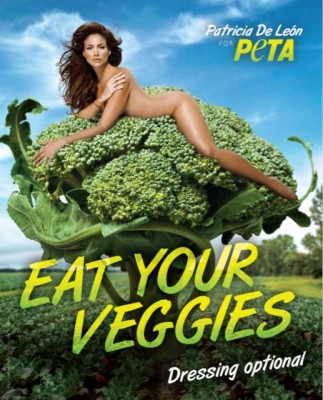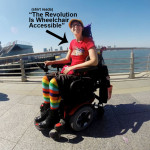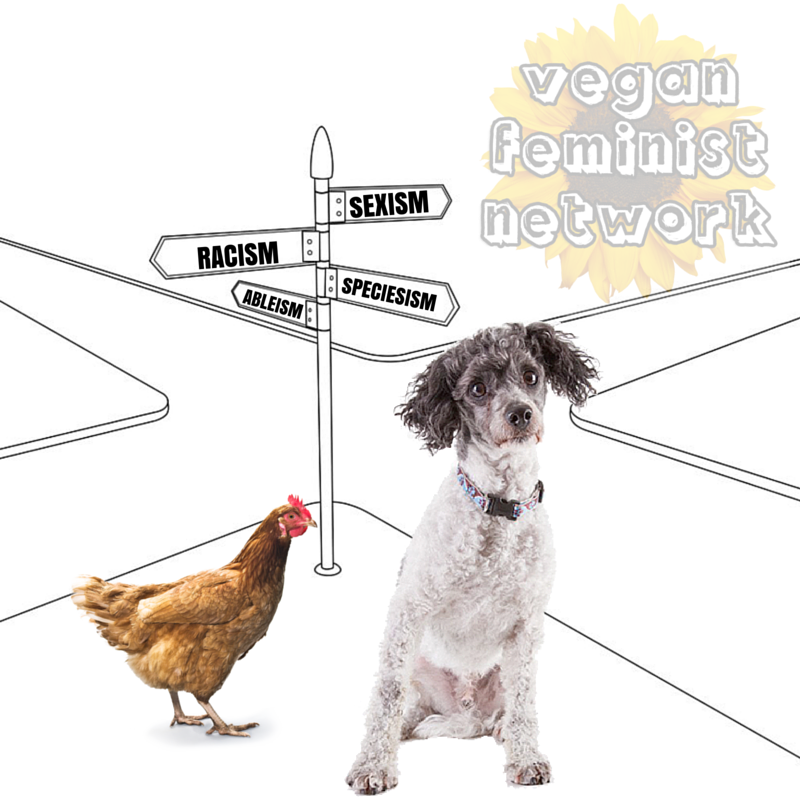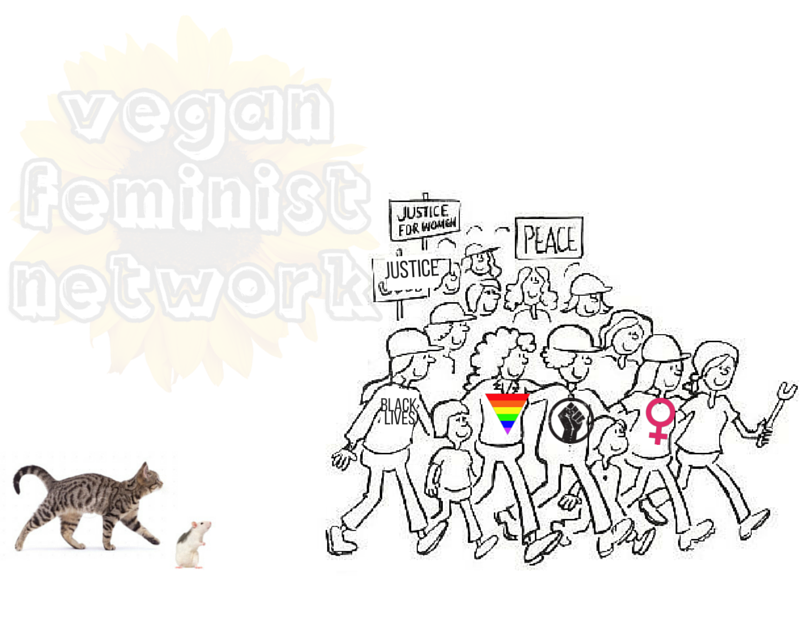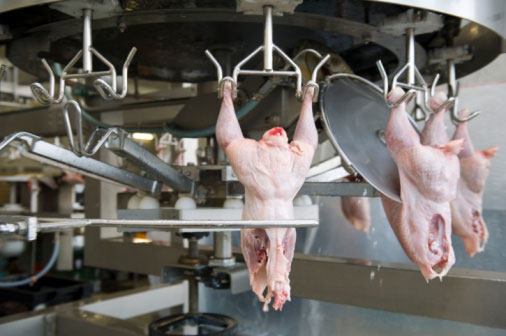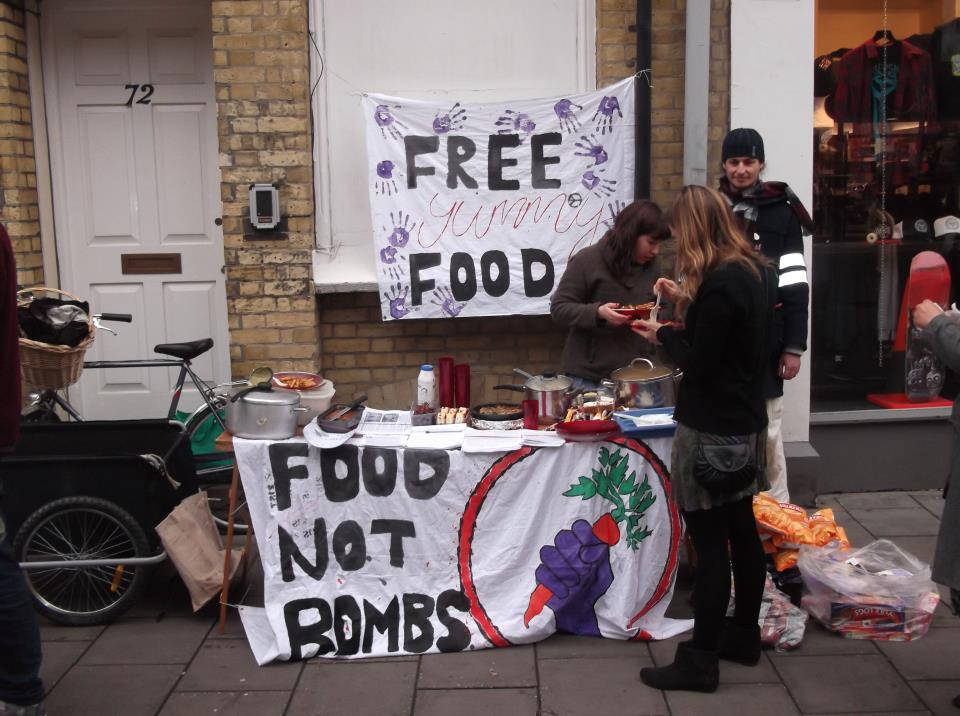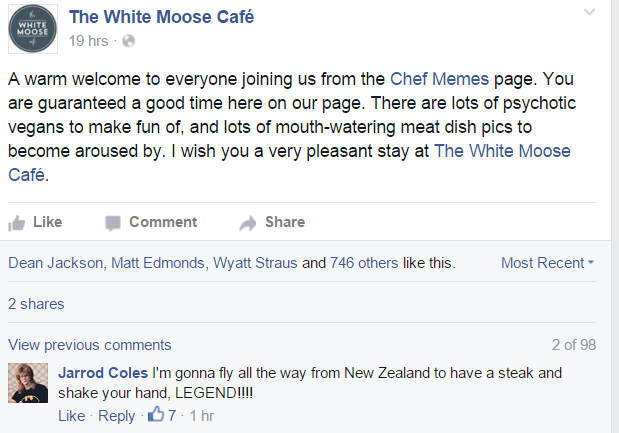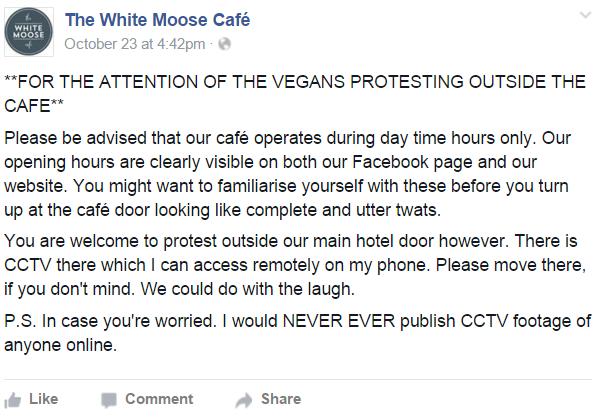| Essay and translation by Hypathia: Feminist and Anti-Speciesist Blog. The original English version of the embedded essay can be found by clicking here. |
Le mot “héganisme” n’est pas arrivé en France me direz-vous. Quoique. On est fins prêts en tous cas. Mardi 16 février 2016, France 5 diffusait “Un monde sans viande” plutôt prometteur. Sauf que. C’est parti en couilles dès les premières cinq minutes. Le documentariste est allé s’acheter un steak végétal chez Sojasun (lien non sponsorisé, même si c’est un voisin de Noyal Sur Vilaine) et en a fait l’analyse. Ce steak végétal est à base de soja, sorte de haricot, donc une légumineuse très protéinée, mais qui a la réputation de contenir des isoflavones, un ersatz végétal d’hormones femelles. Bon pour les femmes de plus de 50 ans, mais mauvaises, très mauvaises pour les hommes et les enfants prépubères et même pubères, dixit le journaliste ! Nous y voilà: le steak de soja est soupçonné de déviriliser les hommes. S’en est suivie une pénible bataille de chiffres et de milligrammes entre une diététicienne défenseuse des couilles des mecs, et la Cheffe de produit de Sojasun qui défend elle son produit et dit que, pas du tout, son steak de soja contient moins d’isoflavones que le prétend la diététicienne. Après le film, durant le débat, le médecin pro-viande a affirmé que les isoflavones sont inoffensives et même plutôt bonnes pour la santé. Mais le mal était fait, à mon avis. Le végétarisme et le véganisme sont perçus comme une menace pour la virilité, comme l’explique Corey Wrenn sur son blog Vegan Feminist Network, dont je vous propose cette semaine la traduction du billet:
What is Heganism?
Héganisme. Oui, c’est bien quelque chose. C’est le véganisme… pour les hommes. “Héganisme” réfère généralement au “rebranding,” à donner une autre image de marque aux traditionnels concepts véganes, afin qu’ils conviennent à la consommation masculine. Mais pourquoi ?
Le mouvement végane est truffé de 101 variations différentes du véganisme, toutes avec la même intention: vendre et faire rentrer des cotisations. C’est le marketing des associations demandant à ses équipes “comment pouvons-nous nous démarquer sur cette tendance? Comment pouvons-nous nous distinguer du reste des autres? Comment pouvons-nous les faire acheter ici et pas ailleurs? Les distinctions de genre servent généralement les intérêts capitalistes et ils le font en maintenant les différences et les inégalités. Spécialiser les produits par genre suppose que les ménages ne doivent plus se contenter d’un seul produit qui peut être partagé (et les produits destinés aux femmes coûtent souvent plus cher). Le produit bleu et industriel pour lui, le produit rose fleuri (plus cher) pour elle.
Genrer est aussi l’occasion d’ouvrir un plus large marché aux produits. Le stigmate féminin est enlevé, ainsi les hommes peuvent les consommer plus confortablement ; mais ce faisant le stigmate ne disparaît pas, il est seulement renforcé. Comme pour “Guy-et,”1 Dr Pepper10 et la lotion Dove men care (pour hommes), genrer le véganisme travaille à protéger la masculinité en ostracisant, en renvoyant à l’altérité ce qui est féminin. Qu’est ce qu’il y a de mal à faire un régime, boire du soda sans sucre, ou manger végane? C’est que ce sont les stéréotypes de ce que les femmes sont censées faire, et les femmes sont le groupe le plus détesté et le plus dévalorisé de la société. Pour que les hommes y participent, il faut enlever le stigmate féminin en créant une alternative “masculine”.

Faire venir plus d’hommes au véganisme est important pour la santé du mouvement végane et pour la santé des garçons et des hommes -la plupart ne consommant pas assez de fruits et légumes. Mais l’inclusion des hommes ne doit pas se faire aux dépens des droits des femmes. Crédit photo: The Advertiser.
La masculinité est largement définie par ce qu’elle n’est pas-et elle n’est pas féminine. Cela marche de la même façon avec le spécisme:2 nous définissons l’humanité comme n’étant pas animale, et donc l’humanité est supérieure par comparaison. On pense aussi qu’elle est l’une des racines de l’hétéro-sexisme : la masculinité est définie par l’ostracisation de ce qui est féminin. En d’autres termes, différencier les personnes en groupes et les placer dans une hiérarchie qui soutient ces différences nourrit une discrimination structurelle. La distinction huile les roues de l’oppression.
Dans mon livre, A Rational Approach to Animal Rights, j’explore le thème du nouveau packaging des espaces véganes. Parce que le véganisme est tellement féminisé, il est considéré comme une menace pour le patriarcat et donc dévalorisé. En réaction, les organisations qui le défendent adoptent le langage du patriarcat pour mieux “vendre” le véganisme. Au lieu de rester ferme sur une opposition féministe radicale à l’oppression patriarcale, les véganes refont l’emballage du véganisme en le présentant comme “sexy” et montrent les femmes comme objets destinés à la consommation des hommes. PETA est probablement la plus détestable association à cet égard, et sa position dominante dans le mouvement signifie qu’elle influence une norme de protestation pornographique. Les femmes véganes ne sont plus facteures de changement, elles sont juste un autre goût “exotique” destinée à être servi sur un plateau au patriarcaux. Ce Tumblr “Galerie hégan” en est littéralement un exemple : les images sont inspirées de la pornographie.
Il y a un réel danger à aggraver les attitudes sexistes dans l’activisme pour les droits des animaux non humains. Le mot “Héganisme” est inutile et insultant. Est-ce qu’un espace végane féminin est si répugnant que les hommes doivent s’en dégager et occuper un espace séparé pour y participer? Si oui, nous devons remplacer et réévaluer notre approche. Aussi longtemps que le mouvement soutiendra la haine des femmes, il ne peut pas raisonnablement attendre de son public qu’il arrête de haïr les animaux non humains.
Le héganisme est une tactique qui se sabote elle-même. Si les activistes soutiennent la notion que le véganisme est “juste pour les femmes” et que les hommes seront stigmatisés s’ils y participent sans la façade de la masculinité pour les protéger, cela rend un mauvais service au mouvement. Au lieu de s’accommoder du patriarcat et du capitalisme pour être entendu.es, les activistes doivent au contraire incorporer une approche féministe à l’antispécisme. De cette façon, tous les intérêts sont pris en compte et un groupe ne sera pas diminué ou exclu au bénéfice d’un autre. Les capitalistes vont inévitablement argumenter que genrer le véganisme c’est simplement nourrir le marché, mais ils créent simplement un marché de cette sorte : “LEGO se résout finalement à créer des jouets pour les filles” (en anglais chez Feminist Frequency). Un marché basé sur l’oppression, un marché qui fonctionne sur des groupes divisés selon la ligne pouvoir contre impuissance, et ce ne sera pas un espace conduisant à la libération.”
Notes:
1. “Guy-et” : jeu de mot intraduisible en français formé de “diet”: régime, et de guy : mec, soit régime pour mec.
2. Le spécisme est un préjugé, une attitude ou un biais envers les intérêts des membres de notre propre espèce, contre les membres des autres espèces. J’ai préféré le mot francisé épicène végane à l’anglais vegan, -ce sont eux qui ont inventé le mot. En français on peut aussi écrire végétalien.
| Edit: Le documentaire de France 5 comportait aussi une visite dans les laboratoires de Beyond Meat, une corporation étasunienne qui tente de cultiver le la viande en éprouvette, un autre cauchemar carniste ; en attendant l’avènement de la viande de culture, leurs steaks végétaux sont fait pour donner le change, oubliant qu’on ne devient pas forcément végéta*ien pour manger des substituts de viande, sauf si on craint de mettre à mal virilité des hommes ? On n’en sort pas. |
 Dr. Wrenn is Lecturer of Sociology. She received her Ph.D. in Sociology with Colorado State University in 2016. She received her M.S. in Sociology in 2008 and her B.A. in Political Science in 2005, both from Virginia Tech. She was awarded Exemplary Diversity Scholar, 2016 by the University of Michigan’s National Center for Institutional Diversity. She served as council member with the American Sociological Association’s Animals & Society section (2013-2016) and was elected Chair in 2018. She serves as Book Review Editor to Society & Animals and has contributed to the Human-Animal Studies Images and Cinema blogs for the Animals and Society Institute. She has been published in several peer-reviewed academic journals including the Journal of Gender Studies, Feminist Media Studies, Disability & Society, Food, Culture & Society, and Society & Animals. In July 2013, she founded the Vegan Feminist Network, an academic-activist project engaging intersectional social justice praxis. She is the author of A Rational Approach to Animal Rights: Extensions in Abolitionist Theory (Palgrave MacMillan 2016).
Dr. Wrenn is Lecturer of Sociology. She received her Ph.D. in Sociology with Colorado State University in 2016. She received her M.S. in Sociology in 2008 and her B.A. in Political Science in 2005, both from Virginia Tech. She was awarded Exemplary Diversity Scholar, 2016 by the University of Michigan’s National Center for Institutional Diversity. She served as council member with the American Sociological Association’s Animals & Society section (2013-2016) and was elected Chair in 2018. She serves as Book Review Editor to Society & Animals and has contributed to the Human-Animal Studies Images and Cinema blogs for the Animals and Society Institute. She has been published in several peer-reviewed academic journals including the Journal of Gender Studies, Feminist Media Studies, Disability & Society, Food, Culture & Society, and Society & Animals. In July 2013, she founded the Vegan Feminist Network, an academic-activist project engaging intersectional social justice praxis. She is the author of A Rational Approach to Animal Rights: Extensions in Abolitionist Theory (Palgrave MacMillan 2016).
Receive research updates straight to your inbox by subscribing to my newsletter.


